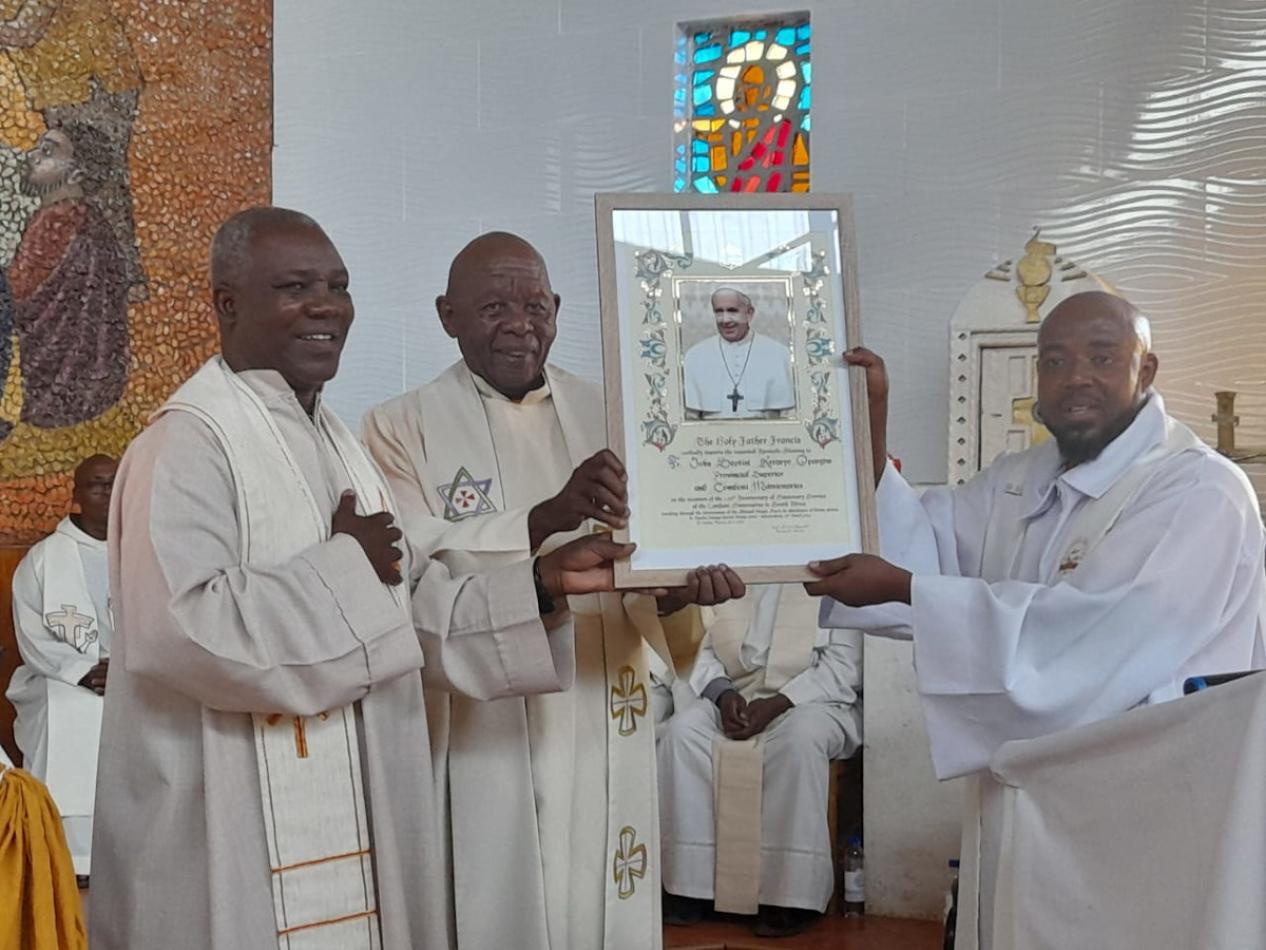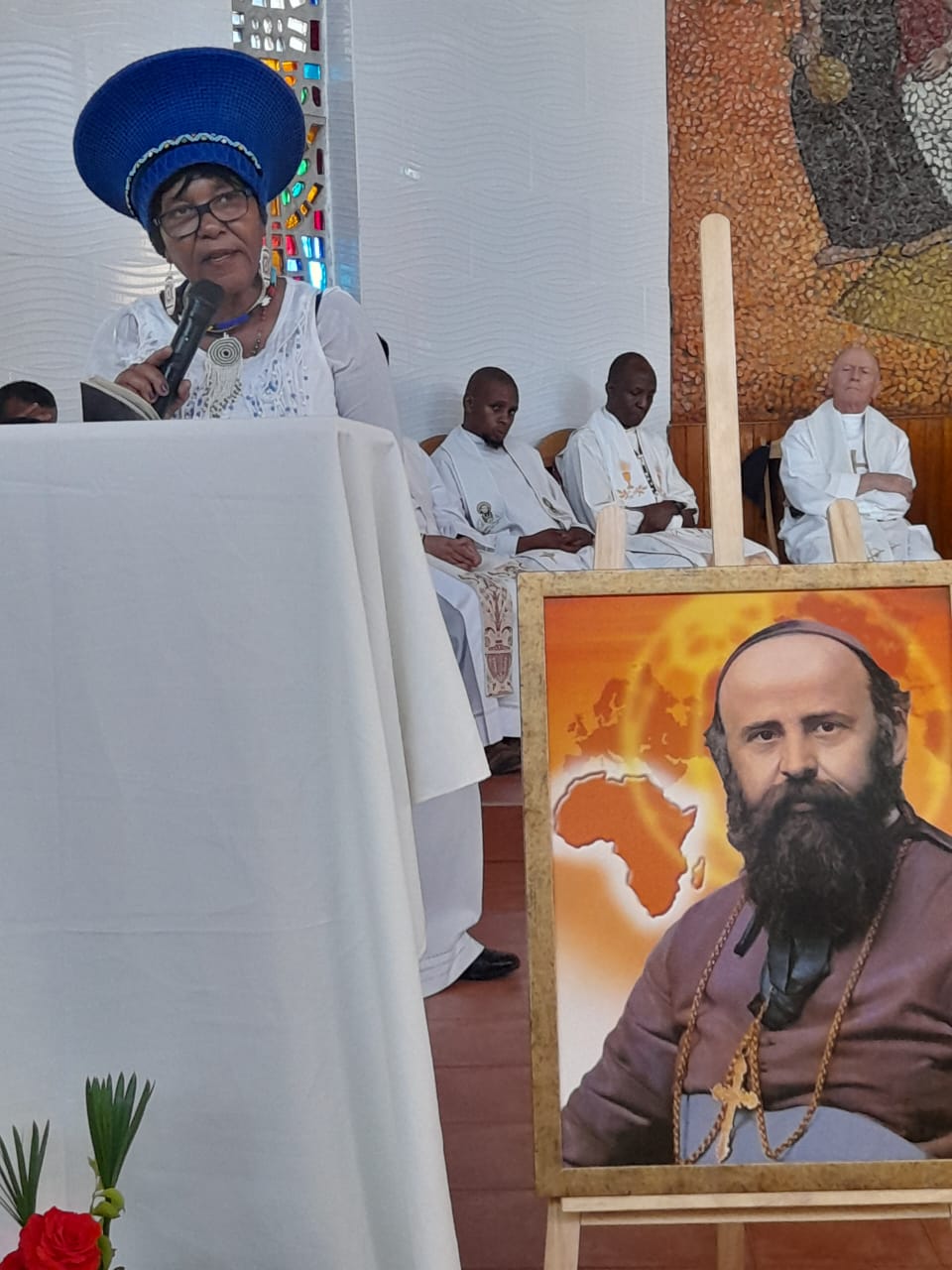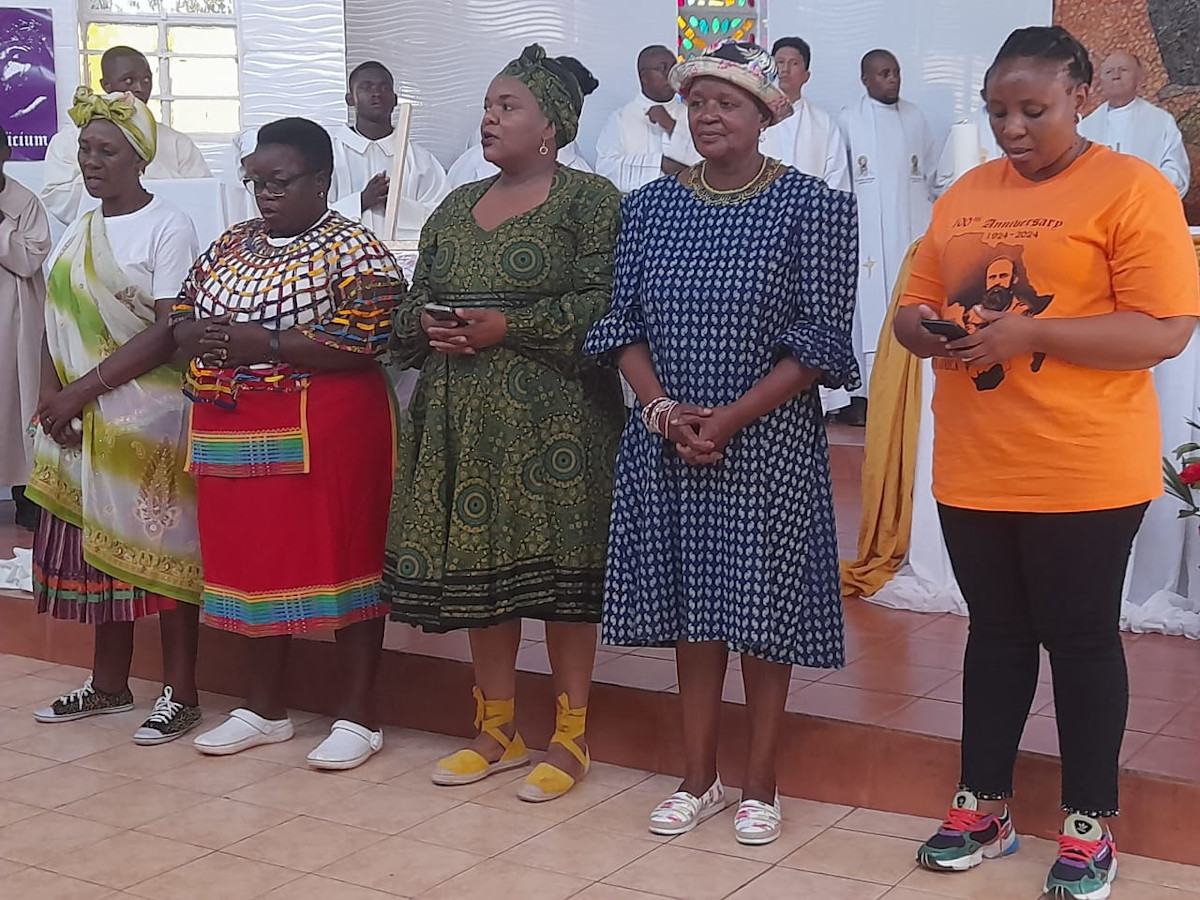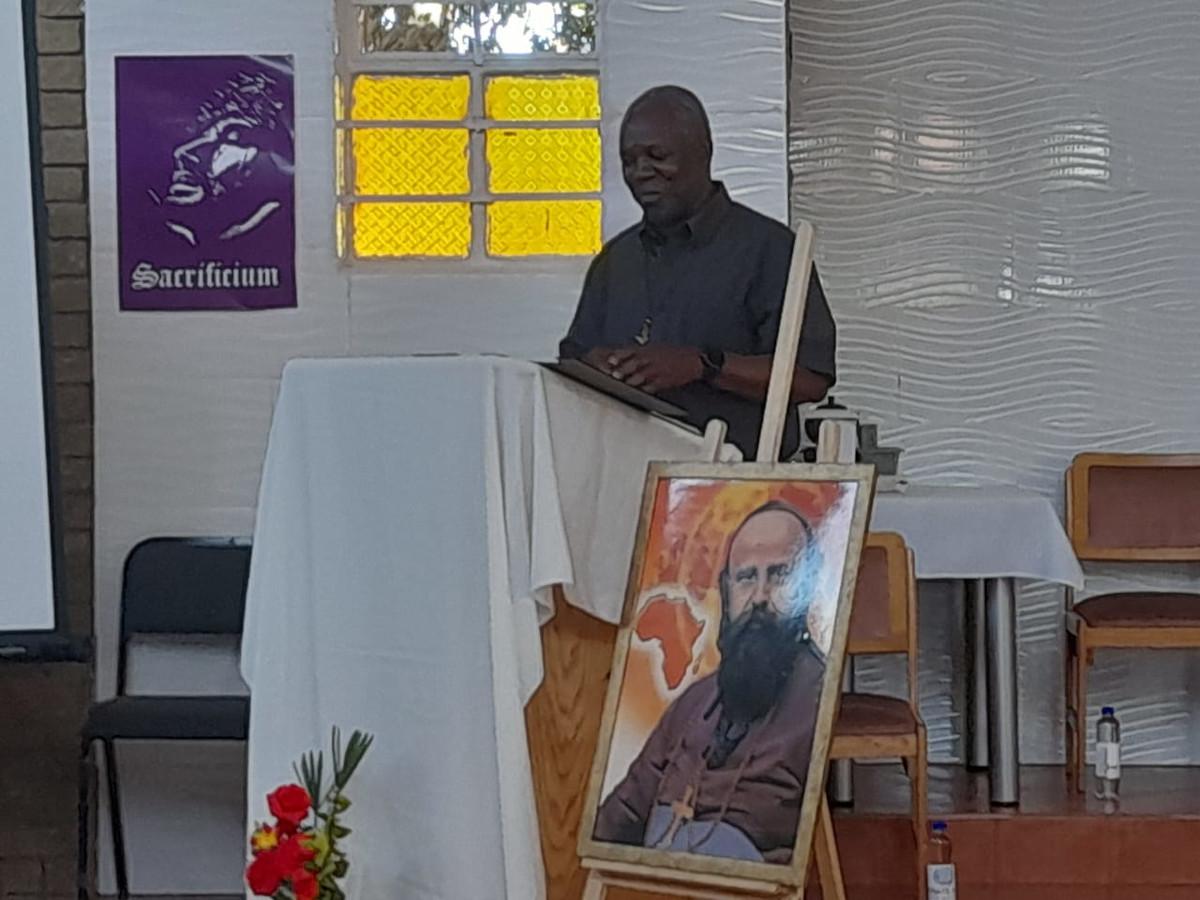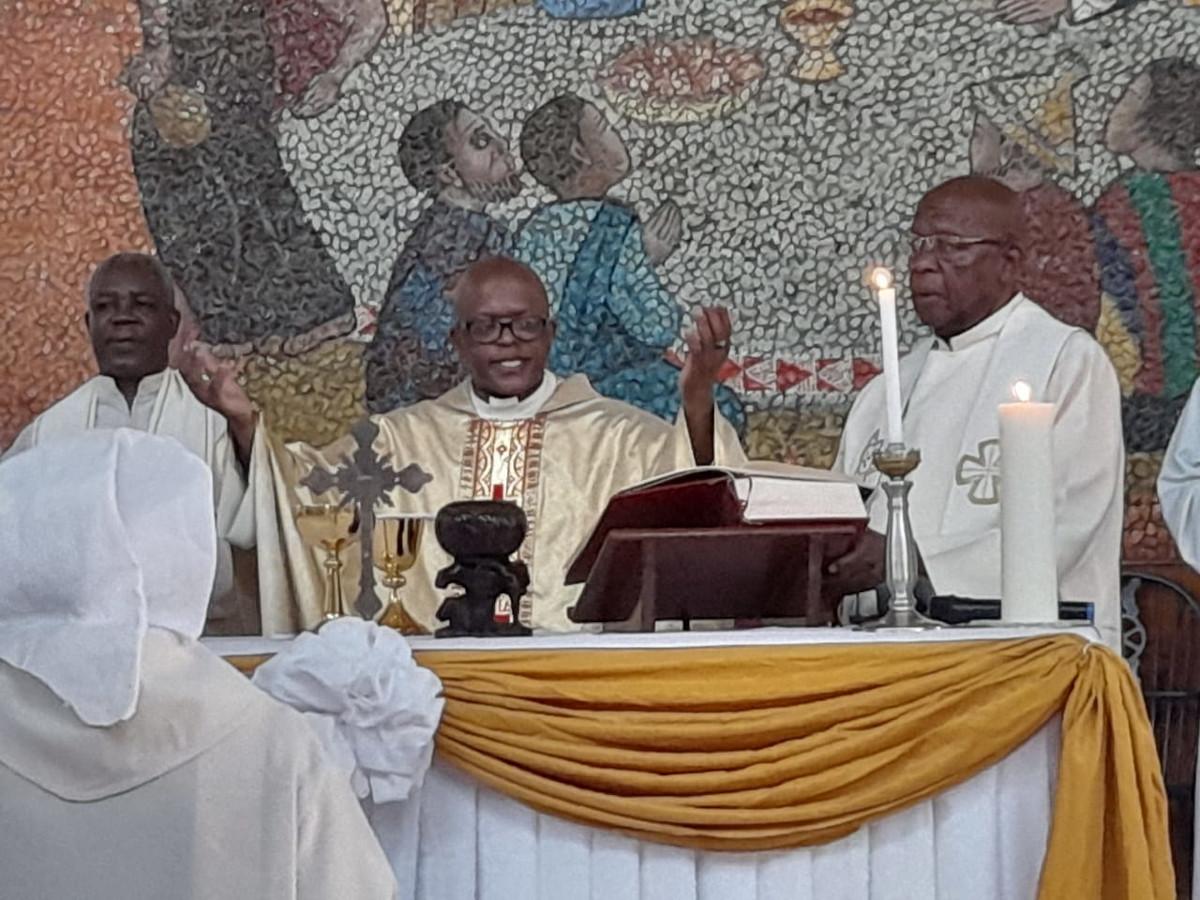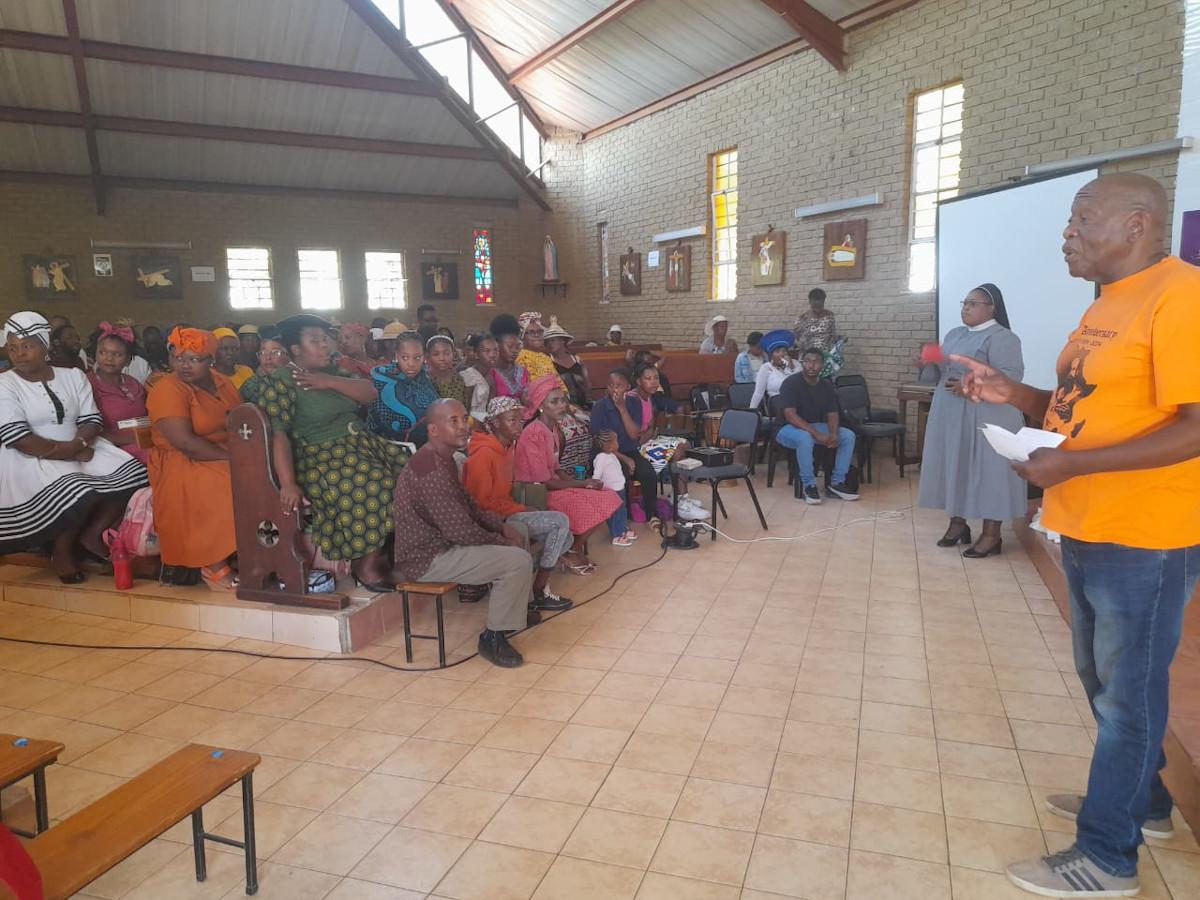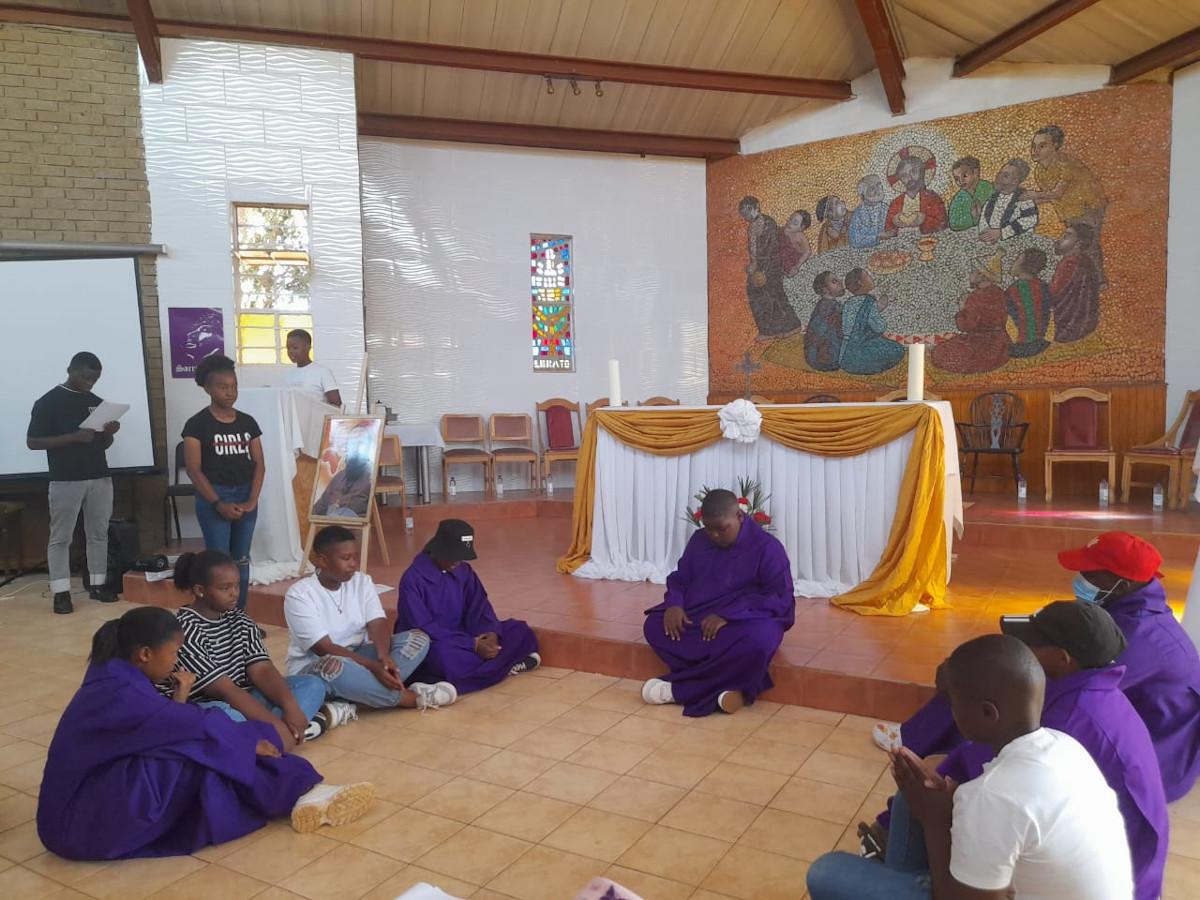Daniel Comboni
Missionários Combonianos
Área institucional
Outros links
Newsletter
Martedì 26 marzo 2024
La seconda celebrazione locale del centenario comboniano in Sudafrica, dopo quella di Silverton, si è svolta il 16 marzo nella chiesa parrocchiale di San Carlo Lwanga a Orange Farm, popolosa township a sud di Johannesburg, nella omonima diocesi. I cristiani che vi hanno partecipato in gran numero hanno voluto manifestare affetto e gratitudine ai nostri confratelli e in particolare a padre Kifle Kirba e padre Francis Manana alla guida della parrocchia, affidata a noi Comboniani dal 2015. [Nella foto da sinistra: Padre John Baptist Opargiw, superiore provinciale, P. Manana Francis Thuli e P. Kifle Kintamo Kirba]
La celebrazione ha avuto inizio alle 9 del mattino con la rappresentazione teatrale di un gruppo di giovanissimi ragazzi e ragazze che hanno attirato l’attenzione dei presenti mettendo in scena la vita di San Daniele Comboni e il suo amore per l’Africa. Padre John Baptist Keraryo Opargiw nella sua articolata riflessione ha messo in evidenza l’originalità di Comboni che anticipando i tempi ha saputo coniugare evangelizzazione e sviluppo umano – tema chiave della celebrazione a Orange Farm – nel suo impegno per la rigenerazione dell’Africa. La cattolicità dell’opera missionaria di Comboni, il fare causa comune con gli oppressi, la lotta contro la schiavitù (ancora presente in forme moderne come il neocolonialismo economico, nella sottolineatura di padre John Baptist), la fiducia negli africani… sono alcuni tra gli aspetti della riflessione offerti ai partecipanti che per la prima volta hanno potuto apprezzare in sintesi la ricchezza del carisma comboniano.
La presentazione del powerpoint preparata da padre Rafael Armada e padre Efrem Tresoldi ha illustrato le principali tappe e luoghi del nostro servizio in Sudafrica in cent’anni, soffermandosi poi sull’impegno per lo sviluppo umano della parrocchia di San Carlo Lwanga che da anni porta avanti una scuola tecnica e il progetto di dopo scuola a favore di oltre un centinaio di bambini che hanno maggiori difficoltà di apprendimento.
Nella sua testimonianza, un parrocchiano conosciuto per il suo lavoro in ambito di giustizia e pace e custodia del creato, ha lanciato una sfida alla comunità cristiana affinché seguendo l’esempio di San Daniele Comboni, alfiere della comunione fraterna, metta fine a ogni tipo di discriminazione, a cominciare dall’abitudine di distinguere sudafricani da immigrati africani.
La celebrazione eucaristica presieduta dal vicario per la vita consacrata dell’arcidiocesi di Johannesburg è stata concelebrata da quindici sacerdoti. Oltre ai nostri confratelli vi hanno preso parte Francescani e Missionari d’Africa che sono stati i fondatori della parrocchia. La corale parrocchiale ha animato la Messa coinvolgendo con il loro entusiasmo l’assemblea con canti accompagnati dal suono di tamburi.
Il pranzo preparato dall’associazione delle donne cattoliche per tutti i parrocchiani ha concluso la festosa ricorrenza locale del centenario comboniano in Sudafrica.
EVANGELIZATION AS TRANSFORMATIVE ACTION
AND INTEGRAL HUMAN DEVELOPMENT
The Example and Legacy of St. Daniel Comboni
By Father John Baptist Opargiw
I gratefully acknowledge the presence of the Main Celebrant of today’s Holy Mass Fr. Solomon Sekabata Mphela, OFM. I equally salute the new Dean of the Vaal Deanery who will be presented to you at the appropriate time by the competent authorities. I thank all members of the Diocesan Clergy present – including the Deacons, fellow religious missionaries (both male and female), the Comboni Sisters, my Comboni confreres and the parishioners of this pastoral zone under the umbrella of St. Charles Lwanga Parish and all of you guests who have come from near and far. You are all warmly welcome to celebrate together with us Comboni Missionaries the 100 years of Comboni presence and missionary service in South Africa.
My reflection this morning is entitled Evangelization as Transformative Action and Integral Human Development. The Example and Legacy of St. Daniel Comboni. I intend to share on this topic by focusing on the person, message and missionary legacy of St. Daniel Comboni. The striking thing about Comboni is that he came from a very humble background and that in the 50 short years of his life on earth, he managed to accomplished a great deal for the evangelization and integral human development of Africa.
Who was Daniel Comboni?
Daniel Comboni was born at Limone sul Garda (Brescia - Italy) on March 15th, 1831, into a family of peasants employed by one of the rich local proprietors. Many of us here can somehow relate to this kind of situation. His parents Luigi and Domenica, were very humble and poor people. They had eight children and Daniel was the fourth born and unfortunately the only surviving child: all the others died young, in fact six of them in their infancy, to be exact. So, as a family they had their difficulties and challenges. They were rich in faith and human values, but poor in material things. It is this poverty that forced Daniel to go away to school in Verona, a bigger town. It happened that in nearby Verona, Fr. Nicola Mazza had established a school free of charge for students of exceptional ability. The gifted Daniel had no difficulty being accepted, though the time away from his family was a hardship for him and his parents.
During the years spent in Verona, Daniel discovered his vocation to the priesthood and completed his studies of Philosophy and Theology. By young adulthood Comboni had learned French, English and Arabic.
In the meantime, he felt a strong attraction to the Central African Mission - a mission marked by the enormous difficulties of isolation, misery, colonial exploitation and slavery.
Comboni was ordained in 1854, and three years later he left for Africa himself, along with five other missionaries of the Mazza Institute and with the blessing of his mother Domenica, who bade farewell to him in these words: “Go, Daniel my dear son, and may the Lord bless you”.
Comboni’s Plan for the Regeneration of Africa
In 1864, while praying at the Tomb of St. Peter in Rome, Fr. Daniel was struck by a brilliant inspiration that led to the drawing up of his famous Plan for the Rebirth of Africa, a missionary project that can be summed up in the renowned expression “Save Africa through Africa” which is itself the indication of Comboni’s boundless trust in the human and religious capacities of Africans. Indeed, the centerpiece of the Plan of Fr. Comboni was always: "Save Africa through Africa".
Comboni welcomed and trained men and women, religious and lay, single and married, Europeans and Africans in the health, social, educational and technical fields, as well as in the areas of agriculture, administration and pastoral work.
Extracts from Comboni’s Plan: “From each of these institutes that will surround the African continent, there will be formed many male and female communities, destined gradually to move into regions of Central Africa, with the aim of initiating and consolidating there the saving work of Catholicism, and of setting up Mission Stations, from which will shine forth the light of religion and civilization. The Groups of African men will be composed of capable catechists, capable teachers and capable craftsmen.” (Writings 828)
“From the group of catechists formed by the young African men, there will be drawn a group composed of those individuals who most distinguish themselves for their holiness and knowledge and in whom there appears to be readiness to enter the clerical state. These will be directed towards the priesthood.” (Writings 831)
With the black young ladies who do not aspire to the marital status shall also be formed a community of "Virgins of Charity", made up of young ladies who are distinguished for their piety and practical knowledge of the catechism, languages and feminine skills.
In this fashion, through the most important ministry of the indigenous Clergy and of te Virgins of Charity, assisted by the good work of the catechists, teachers, craftsmen, school mistresses, women teachers and housewives, many Catholic families will gradually be formed and flourishing Christian associations will be founded. Our Holy Religion will spread its saving influence over the African family and will gradually extend its wholesome sway over the vast expanses of the unexplored regions of the whole of Africa.” Writings 834)
“The Association in charge of directing the new project will, as its great work progresses, found four great African Theological-Scientific Universities at the four most important points of Africa: along the Mediterranean, Indian Ocean and Atlantic Ocean coasts.” Writings 838)
Comboni has left us a legacy of an integrating mission, which embraces the whole reality of the human person, characterized by the inseparable dimensions of direct evangelization and of human promotion. Besides this, we notice Comboni’s concern for the prophetic promotion of the dignity of the woman and of her primary role in evangelization. He boosted the role of the laity in all fields, including that of missionary apostolate.
I would like to single out Comboni’s tireless efforts in promoting the lay service of the catechist. Comboni was really much ahead of his time. You can imagine that it is only recently in the Third Millennium that Pope Francis officially instituted the Lay Ministry of Catechists. Catechists are a treasure in the Church. Catechists are in the frontline of the Church’s evangelization mission. Comboni also conceived of human development as cultivating the arts and professions, fostering the role of the family and of women in the transformation of culture and society.
Comboni’s pioneer experience at Malbes Village in Sudan
The context in Sudan during Comboni’s time was that of a majority Muslim population and it was indeed very difficult for Christians to live in a Muslim environment. Therefore, Comboni decided to establish a new mission at Malbes, near El Obeid, so that new Christian families would enjoy an environment favourable to their religious growth and their human development. Malbes was a model of integration between evangelization and human promotion.
Here is how Comboni himself describes this Malbes project:
“We have thought of embarking on a great (financial) sacrifice by buying large areas in the plains of Malbes, which are having sufficient water. […] To each family we have assigned a piece of land to cultivate, we have also distributed a good amount of grain for the sowing, so that they may become independent, […] under the supervision of the Catholic mission, through the fruits of their labour and the advantage of those arts and crafts they have learned in the mission.
These Catholic families will gradually form a Catholic village, a Catholic neighbourhood and, in time, it will become a completely Catholic city, which will be an example for the rest of the population.” (Writings no. 4528-4529.)
Comboni’s international and intercultural Mission
Comboni was characterized by his strong sense of catholicity in dreaming and promoting a culturally sensitive and inclusive Church, open to people of all races and languages. His mission of evangelization is for all peoples, especially the most marginalized.
Comboni’s goal was to unite people, to break down walls, to build a world in solidarity, to forge a spirit of authentic welcome, in the name and for the love of God – manifested in Heart of Jesus that loves and embraces all.
Comboni strongly believed in the integration of various nationalities and cultures since the beginning of his missionary enterprise, based on respect, on the spirit of charity and on dialogue.
Another characteristic element of Comboni’s mission was the respect for the dignity of all human beings. He could not stand the horror of slavery, the oppression and de-humanizing treatment of some people based on race or colour of the skin. As Christians, therefore, we are called to fight every form of slavery. Unfortunately, however, slavery is not just something from the past. In the Africa that Comboni loved so much, which is today torn by so many conflicts, political exploitation has given way to an economic exploitation that is equally enslaving.
What Lessons can we learn from the Legacy of St. Daniel Comboni?
- Comboni’s fidelity underlines for us more than ever the truth that “to make common cause” with the local people needs to become ever more concrete. This can happen in the way we show we are near to people and by an attitude of humility, of friendship, of trust, of sharing, careful that our presence is an incentive and a true common participation in the carrying out of pastoral and social programmes.
At the same time, we as missionaries must avoid two extreme and ambiguous attitudes, namely:
- Taking the place of the local people by doing, deciding, carrying out everything on their behalf. Atate Father must do this and do that while the local people just relax. No, this is not right! The Church belongs to us all.
Everyone must roll up his/her sleeves and work hard, thus making his/her contribution to the growth of the Church. Then we can all be proud that this is OUR CHURCH!
- Becoming passive and distant spectators, looking at the life and struggle of the local Church as if from the outside and from above without any involvement. Comboni’s example of life urges us to make common cause with the local people, come sunshine, come rain, to be equally at their service.
- The commitment in the domain of education, health, justice and charity is an integral part of evangelization, for there is a profound connection between evangelization and human advancement. We are therefore invited to focus on the people in dire need, by supporting them both materially and spiritually, thus empowering them.
I congratulate you for what you are doing in your Parish in this regard, with the school, feeding programme, care for the environment, justice and peace. However, there is still a long way to go to reach self-sustainability and real socio-political consciousness.
- Formation is an essential element in the development of the local Church particularly in these times of relativism and secularization. There are many voices fighting for our attention and the result is confusion and moral degradation. In our formation endeavours we must give a special attention to the families and to the youth, especially today as they experience grave hardships – like poverty, displacement of peoples, lack of security, the temptation to return to ubungoma practices and the like.
- Another lesson from Comboni concerns the capacity of reading the signs of the times and having a close look at reality and adequately responding to the challenges posed. The clarion call here is to address the broad scope of the human condition—justice, peace, self-determination, equality, and especially human dignity. The Good News is to be proclaimed and lived in the concrete context or reality of the local people. At this juncture I would like to highlight an important point in Pope Francis’ Lenten Message for 2024: If our celebration of Lent is to be concrete, the first step is to desire to open our eyes to reality. When the Lord calls out to Moses from the burning bush, he immediately shows that he is a God who sees and, above all, hears: “I have observed the misery of my people who are in Egypt; I have heard their cry on account of their taskmasters.
Indeed, I know their sufferings, and I have come down to deliver them from the Egyptians, and to bring them up out of that land to a good and broad land, a land flowing with milk and honey” (Ex 3:7-8). Today too, the cry of so many of our oppressed brothers and sisters rises to heaven.
Let us ask ourselves: Do we hear that cry? Does it trouble us? Does it move us? All too many things keep us apart from each other, denying the fraternity that, from the beginning, binds us to one another.
Finally, turning now to the South African reality we notice that it is currently experiencing a certain socio-political instability, rampant corruption, inequality, that can be compared to a “double decker bus with a comfortable upper deck and a crowded uncomfortable lower deck and no stairway between” (Allister Sparks) resulting in abject poverty; high cost of living, high rate of unemployment especially among young people and women.
Other ills include high rate of crime, gender-based violence, vandalism and disintegrating infrastructure, examples of which are the almost “chronic” countrywide load-shedding and water-shifting.
In this kind of reality, there is indeed a lot of despair, uneasiness and pent-up anger in the population. However even if things may look rather bleak overall in the country, there are always potential opportunities to be unearthed. The current situation is in fact a great cry for hope, which is a human hunger or desire within us for more life, for something good to happen.
The State of the Nation Address (SONA 2023) by President Cyril Ramaphosa, underlined the same idea: “we are at our most essential, a nation defined by hope and resilience. Even in this trying time, it is hope that should sustain us and fuel our determination to overcome even the greatest of difficulties”.
According to me the big challenge is how to pursue the economic and political conditions that will spread the country’s wealth throughout the population. We Comboni missionaries are called to respond to the current situation of our country and world and become missionaries who are hope-filled and hope providers. The challenge therefore is to move from an inward-looking mission to a mission that is outgoing and with a face to the world, according to Comboni and Pope Francis. Moreover, the Catholic Church in Southern Africa has invited us to go out of the sacristy and be present to people who are left alone in desperate situations (SACBC, Mid-year meeting at Mariannhill, August 2019).
Father John Baptist Opargiw

